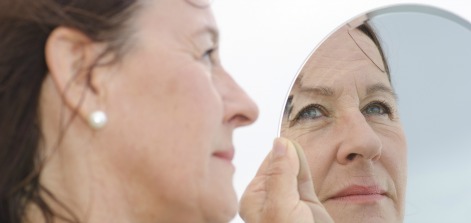Why do our perceptions of people change as they age? Are they not the same people just because they have a few more lines on their faces? Author Nicci Gerrard discusses the invisibility of the elderly and that strange moment when she looked in the mirror and didn't recognise the older lady looking back at her.
Not so long ago, I was charging along a narrow aisle of a large department store, on an errand, late, harassed, hot, grumpy and unkempt, and I met a middle-aged woman coming running towards me. I noticed that she looked a bit like a demented crow; she had a gaunt face and lines around her eyes and on her face was an anxious expression. I think her shirt was wrongly buttoned. She was obviously in a hurry. I put up a hand in apology and she put her hand up as well – and I realised that she was me. I was looking at myself in a mirror. I was that demented crow.
So this was how I looked to strangers when I was running through a department store on an errand: not slim and poised and purposeful but scrawny, worried and slightly unhinged. It was a grim and hilarious revelation. We think the world sees us more or less the way we see ourselves, but in fact there’s a radical mismatch. The older we get, the more the gap between our own sense of our self and the world’s widens. How many of us look in the mirror and think: but that’s not me, not the real me, the one I carry round inside myself.
My gallant and fabulous mother is in her eighties. She is registered blind, has had multiple strokes and cancer; she has been an invalid for decades because of botched medical treatment for a bad back; she has arthritic hands and swollen ankles. But she thinks of herself as young and has the spirit of someone in her twenties (or maybe younger), someone endlessly ardent and hopeful, setting out on life’s journey. When strangers meet her, they look past of her complicated, resilient, stubborn character and what they see is her age and her frailty. They admire her because she is old. They no longer see the person that she is, so brimful of ambition and desire.
The older we get, the more the gap between our own sense of our self and the world's widens. How many of us look in the mirror and think: but that's not me, not the real me, the one I carry round inside myself.
My beloved father has always been a mild-mannered, courteous, private person, very stoical and very sweet-tempered, but also a practical joker and an eccentric inventor of devices to make my mother’s life easier. He was always proud of being a doctor – but now when people meet him, they bend down to him and call him dear and ask how ‘we’ are doing, as if even the correct pronoun has been lost to him and the singular erased. Or they don’t bend down at all – they talk to me and my siblings, or his carer. The nurses and doctors I have loved in hospital – where he has spent much time recently – have been the ones who sit by his bed and call him ‘Dr Gerrard’, who see beyond his wrinkles and his white hair and his vulnerability, and are respectful and attentive.
Sometimes I catch myself saying that my mother ‘was’ beautiful, when of course she still is. Or my father ‘was’ clever and kind - as if the old become like ghosts in their own life. I hear people talking about their parents, using words like ‘naughty’ or ‘silly’, like small children. (In the same way, people will often say ‘I love children’ and ‘I love old people’, stripping them of individuality and slotting them into a simple category.)
If we are lucky, we will become old. And yet our culture denies old age; we talk of ‘them’ rather than ‘us’. In my novel, The Twilight Hour, I wanted to make what is invisible visible again. Through the central character, 94-year-old Eleanor, I intended to show a whole vivid and richly complicated life: Eleanor is old, but she contains all the selves she has ever been – the stubborn child, the independent young woman, the woman in love, the teacher, the mother, the grandmother. Eleanor stands for all of us: we all want to be recognised, to be seen as individual, human and unique. We can start by the way that we look at the world, seeing others the way we want to be seen ourselves.
*The Twilight Hour by Nicci Gerrard is published by Michael Joseph on 23rd October 2014, £7.99 paperback or £4.99 ebook*






